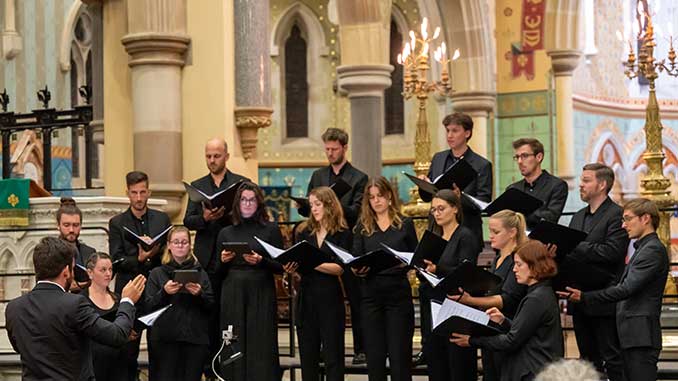 It’s not often a Monday evening is lifted with an enriching divertissement that washes away the humdrum of the day. But that was precisely the upshot for those who attended East St Kilda’s beautiful All Saints’ Anglican Church to hear the award-winning Neuer Kammerchor Berlin (NKB) in concert, presented by Royal Melbourne Philharmonic (RMP).
It’s not often a Monday evening is lifted with an enriching divertissement that washes away the humdrum of the day. But that was precisely the upshot for those who attended East St Kilda’s beautiful All Saints’ Anglican Church to hear the award-winning Neuer Kammerchor Berlin (NKB) in concert, presented by Royal Melbourne Philharmonic (RMP).
In just seven years since NKB director and conductor Adrian Emans founded the choir, the ensemble have collected prizes and accolades reflecting the range and versatility of their talents with an a cappella repertoire heralding choral music from the literature of the Renaissance to contemporary classical works, as well as premiering works by young composers.
On their first visit to Australia, Emans and 16 NKB touring singers not only introduced and showcased samples of their glorious, harmoniously sung and dynamically contrasted choral treasures with enthusiasm but, together with warm support from RMP director and conductor Andrew Wailes and the RMP Choir, demonstrated how palpable the power of music is through communal spirit and intercultural exchange.
After a cordial welcome from Wailes, Emans led the NKB out on a vocally and spatially far-reaching endeavour with Wolfram Buchenberg’s Von 55 Engeln behütet (Protected by 55 Angels). Composed in 2008 and based on a blessing of travel likely recorded in the 13th century, the choir captured the dynamically rich work in breathtaking form, highlighting its poignant and evocative nature before a single mesmerising bass note disappears into the abyss.
Following, the choir split to each side for Josef Rheinberger’s Kyrie from Mass in E flat, a translucent and reposeful piece dedicated to Pope Leo XIII, written in 1878 and to which the soaring soprano lines were especially outstanding.
Back in central formation, Australian composer Paul Stanhope’s Bangaray (The land is healed) – from his dramatic cantata which premiered in 2014, Jandamarra – Sing for the Country – was a heartfelt and shining exploration of the ravishing soundscape of peaks and valleys in a work pointing to the horror of conflict and victory of survival.
Four of the Five Traditional Songs arranged by English composer John Rutter brought further evidence of each singer’s depth of experience, the ensemble’s clearly united mission and – incomparable in any other way but a live performance that included, without hindrance, an ambulance siren and motorcycle revving – each individual’s expressive style and subtle engagement with each other.
The competing layers and rhythmic jollity of The Girl I Left Behind Me signed off with a fine whistling end. Alluding to the challenges of love, the airiness and sensitivity excelled in O Waly, Waly, the fluidly rendered Golden Slumbers sailed its lullaby with dreamy bobbing abandon and Dashing Away With the Smoothing Iron, concerning a man enamoured by a girl as she goes about the daily washing and ironing of clothes, entertained with its jaunty and characterful portrayal.
While the NKB singers took a little time off, Wailes and a large contingent of RMP choristers reprised 4 works they had so marvellously interpreted nine days earlier at the same altar as part of the concert, Bruckner Te Deum and sacred motets.
Striking purity and divinity partnered Bruckner’s 1869 Graduale: Locus iste and splendid warmth of tone emanated for Offertorium: Afferentur regi to organ accompaniment by Andrew Bainbridge despite brief sagging momentum midway.
The imposing rumbling bass work was the standout in the reverential Antiphon: Tota pulchra es, Maria with Wailes standing in admirably and convincingly priestly – only minus the chasuble – for the solo tenor part while also conducting.
The psalm-set Graduale: Os justi meditsbitur was the crowning glory, sung with a transformative beauty inspiring thoughts of music matching and describing an awe-inspiring cathedral from the depths of the crypt to unreachable heights of stained glass clerestories and vaulted ceilings.
The NKB singers returned to give a particularly stirring, delicate and emotive Lacrimosa from Ukrainian composer Valentin Silverstrov’s Tryptychon, 3 sacred songs.
In their final piece, passion and poignancy was brought to the extraordinarily woven and reflective characteristics of Daniel Elder’s Elegy. Featuring sublime eddying arpeggios, the young American’s work refers to the search for consolation after a loved one’s death, based on Taps by Daniel Adams Butterfield.
In the spirit of the occasion, both choirs combined to close with two potent works. The first – German early Baroque composer Heinrich Schütz’s Selig sind die Toten – displayed inviting, quasi-theatrical and descriptive warmth in its portrayal.
And closing the evening, sincerity and restraint oozed from the evocatively lilting and wafting progression of 19th century German composer Franz Biebl’s Ave Maria, originally written, remarkably, for a firemen’s chorus (Wailes’ concise and informative add-ons were much appreciated)
There was indeed a celebratory feeling to the 90-minute concert at which prizes were swapped. From NKB to RMP came German sweets, a tuning fork and, unashamedly, a CD of their work. From RMP to NKB, it was a soft kangaroo, Aussie cork hat and most importantly, a boomerang because, of course, everyone would be overjoyed for the ensemble to come back.
Neuer Kammerchor Berlin in concert
All Saints’ Anglican Church, Chapel Street, East St Kilda
Performance: Monday 9 October 2023
Information: www.rmp.org.au
Image: Neuer Kammerchor Berlin (NKB) and Royal Melbourne Philharmonic (RMP) – photo by Paul Dodd
Review: Paul Selar
